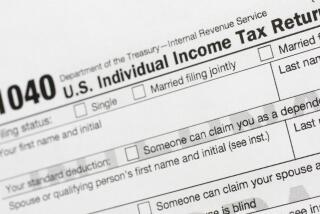This year, delaying taxes can be particularly costly
- Share via
Don’t wait to tackle taxes this year, or your small business may miss out on credits that would lower your 2009 tax bill or face a delay in getting much-needed cash from a refund.
California’s new hiring tax credit, for example, awards as much as $3,000 per qualified new employee to small businesses that ended 2009 with more full-time workers than they started. But the $400-million program ends when the money runs out.
And although the federal government -- and, as it stands for now, California -- won’t run out of money for tax refunds, why wait to get the cash? The later you file, the longer it will take to get your money.
More small businesses may end up qualifying for refunds for 2009, and even for prior years, as the effects of the recession triggered potential tax savings.
Companies that lost money last year or had debts forgiven, for example, qualify for certain deductions.
“You are definitely going to see a lot of companies taking advantage of that -- that’s why the government enacted the rules, so it could help get money back into those struggling businesses and potentially create jobs,” said Michael Kaplan, tax partner at accounting firm Miller, Kaplan, Arase & Co. in North Hollywood.
A small business that posted a loss in 2009 can apply that loss against profit made in prior years and earn a federal refund by filing an amended return. Given that many businesses were profitable until last year, that strategy is likely to be popular, experts say.
Also, those businesses that had their debt forgiven by a creditor might be able to delay the tax due on the forgiven amount for several years under a new rule.
Small businesses also need to keep an eye on the many proposed tax benefits, including deductions and credits. Deductions work by reducing income subject to taxes. Credits count against the tax bill owed.
Two of the many under discussion in Washington are a $1,000 federal hiring tax credit and a payroll tax credit, both approved by the Senate.
Keeping track of fast-changing tax laws is important for a business’ strategic planning, such as when to hire or buy new equipment.
But it can be tough for overloaded small-business owners to stay abreast of changes.
“So many businesspeople I know are too busy cutting up onions or whatever to worry about this other stuff,” said Russ Cugno, who scoops ice cream, chocolates, nuts and dried fruit to concoct the shakes and smoothies he sells at Land of Fruits and Nuts aboard the Queen Mary in Long Beach.
The tough economy has many owners working even harder. Cugno added local delivery four months ago to boost sales and now spends afternoons on the road.
Markell R. Steele, a career counselor and owner of a part-time, home-based business, Futures in Motion Inc. in Long Beach, said she has no interest in taxes “whatsoever” but makes sure she takes the time to keep good records of expenses and revenue.
“In order for you to really either maximize any kind of deduction and mitigate any risk and reduce any liabilities, you have to know what you are working with,” Steele said.
For a list of federal tax changes for businesses, go to the Internal Revenue Service’s website at www.irs.gov and type in “2009 tax changes for businesses.”
More home-based businesses were set up last year as laid-off workers looked to create income.
They will qualify for a number of tax deductions, including Internet access costs, said Bob Meighan, a certified public accountant and vice president of TurboTax.
For more information on business expense deductions, check out the IRS’ online Small Business and Self-Employed Tax Center at www.irs.gov /businesses/small.
Sooner is better than later when it comes to taking care of your small-business taxes.
Said Steele: “It’s not wise to bury your head in the sand.”
More to Read
Inside the business of entertainment
The Wide Shot brings you news, analysis and insights on everything from streaming wars to production — and what it all means for the future.
You may occasionally receive promotional content from the Los Angeles Times.









